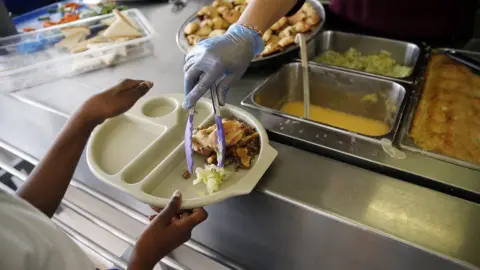Universal credit: Free school meals proposal keeps cliff edge
 Getty Images
Getty ImagesThe government has launched a consultation about how eligibility for free school meals will work under universal credit in England.
The issue is right at the heart of universal credit because the idea of the new system is that there are no cliff edges, so it is always worth a household working extra hours to earn more.
Universal credit is the system being rolled out by the government to replace six benefits including income support, housing benefit and Jobseeker's Allowance.
At the moment, children in all households that have been switched to universal credit also qualify for free school meals (FSM).
But if that were to be rolled out universally, it would mean that significantly more children would get free meals than do currently.
This is because not all of the old benefits that have been combined into universal credit qualified for FSM.
 Getty Images
Getty ImagesNew proposals
On current benefits, families stop qualifying for FSM when they are working 16 hours a week and switch to working tax credit.
Only about 8% of relevant benefits claimants have moved to universal credit so far.
The government is now proposing that households will stop being eligible for FSM when they are earning £7,400 a year (excluding benefits).
It says that will mean an extra 50,000 pupils will be eligible.
It makes sense that eligibility would grow because 16 hours a week for over-25s at the National Living Wage of £7.50 an hour would provide annual earnings of £6,240, which is below the threshold. But clearly there are also those who will lose out, for example, if they were working fewer than 16 hours a week but being paid enough to take them over the £7,400 mark.
Also, 50,000 pupils is a fairly small proportion of the 1.1 million pupils the government says currently benefit from FSM, excluding those in Key Stage One who all get free meals.
Clearly, it's not nearly as big an expansion as would have happened if the government had continued to give free school meals to all households on universal credit, which the Resolution Foundation estimated would mean 1.7 million extra children qualifying at a cost of £600m a year.
It's also not as generous as the system in Northern Ireland where a household is allowed to earn £14,000 before losing FSM eligibility, but it's about the same as the system in Scotland where you can earn £610 a month (£7,320 per year).
Wales has not yet decided what to do about free school meals under universal credit.
 Reuters
ReutersLosing free meals
The problem with the new regime is that it creates a cliff edge, which universal credit is not supposed to have.
If a household is earning just under £7,400 and has the chance to earn slightly more money, it may have an incentive to turn it down.
Free school meals are worth £2.30 per child per day, which over a 38-week school year comes out at £437 per child, so even for a household with a single eligible child, taking on an extra hour of work per week at £7.50 an hour would mean a loss of income.
In the short-term, there are protections for those losing their eligibility as part of the move to universal credit. No family that is going to lose its entitlement to free school meals will lose it before the benefit has been rolled out to the whole country.
Once that has happened, they will not lose it until each child has finished their current stage of school (primary or secondary).
It is not clear after the roll-out has been completed how soon after earnings rise above £7,400 the free school meals will be lost and the Department for Education has been unable to clarify this.
The public consultation announced by the government also covers the pupil premium which is extra money paid to schools and is related to FSM.
Schools currently receive an extra £1,320 for each pupil between reception and Year Six who has claimed FSM in the previous six years, and £935 for pupils in Years Seven to 11.



